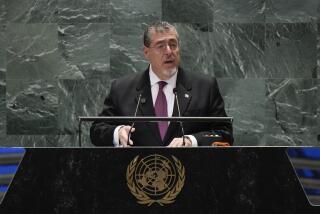U.S. Will Pay Haitian Soldiers to Not Do Jobs
- Share via
WASHINGTON — The U.S. government intends to pay the regular salaries of members of Haiti’s widely reviled army and police force for doing exactly nothing, on the theory that nothing would be far better than a likely alternative: waging guerrilla warfare against the restored government of President Jean-Bertrand Aristide.
J. Brian Atwood, director of the Agency for International Development, said that the half-billion-dollar Haiti recovery plan includes $5 million for military demobilization, some of it intended to keep soldiers and police on the payroll for four or five weeks while about 3,000 of the least cruel are chosen for an interim police force and the rest are placed in public works jobs.
“We have to pull the teeth of this dragon,” Atwood said. “We do not want to move in such a way that the military personnel that are not scheduled to stay on will grab arms and go back into the hills.”
Aristide’s government eventually plans to cut the 7,000-member combined army and police force to about 1,500 soldiers while establishing a properly trained civilian police force. Some of the interim police will win spots in the new force, but many others will not.
Atwood said that the demobilization money will prove to be a bargain for the U.S. donors and the Aristide government if it clears the way for a peaceful reorganization of the armed forces.
“We will be performing the function of providing salaries and jobs and retraining,” Atwood said.
The World Bank and the leading donors of international aid agreed in August on a $550-million aid plan covering the first year after Aristide regained office. The total, of which Washington will contribute about $200 million, is more than a quarter of Haiti’s annual gross domestic product.
The program is intended to create more than 50,000 jobs to repair the devastated environment and crumbling infrastructure. Many demobilized soldiers will be offered jobs, but there will be more available for the unemployed.
Although most of the jobs will be of short duration, Atwood said the projects are important in helping to start Haiti on the road to recovery. United Nations economic sanctions imposed after the 1991 coup that drove Aristide from power reduced the gross domestic product by about 20% and forced impoverished Haitians to savage the ecology in an effort to survive.
Atwood said that it was a devastating error to ban the importation of propane gas for cooking because it resulted in Haitians cutting down most of the nation’s trees to produce charcoal for cooking. With the trees gone, he said, about 20% of the topsoil washed into the Caribbean.
More to Read
Sign up for Essential California
The most important California stories and recommendations in your inbox every morning.
You may occasionally receive promotional content from the Los Angeles Times.













